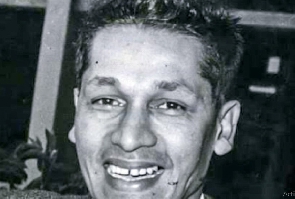 Pio Gama Pinto. Photo via Nation
Pio Gama Pinto. Photo via Nation
oday marks the 58th anniversary of Pio Gama Pinto, a symbol of Kenya’s anti-colonial and anti-imperialist struggle. He was a month shy of turning 38 when he was killed, but the impact of his struggles and crusades continues to reverberate throughout Africa, Asia, and in fact, the entire world as a result of his tenacity and participation in the liberation of Kenya from colonial rule.
Pio Gama Pinto was a journalist, politician, and anti-colonialist activist from Kenya. He was born in Kenya to an Indian family and received his education in both India and Kenya. Pinto was a key figure in Kenya’s fight against British colonial rule. He joined the Kenya African Union (KAU), Kenya’s first political organization, and later became a founding member of the more radical Kenya African National Union (KANU).
Pio Gama Pinto used his tenets as a journalist to expose the colonial government’s injustices and brutality. He was arrested and detained on several occasions for his activism and writings, including a 1953 article criticizing British rule in Kenya and calling for independence.
Pinto, as he is popularly called, was elected to Kenya’s Legislative Council, becoming the country’s first non-European to do so. He championed and advocated vigorously for Kenyan workers’ and peasants’ rights, as well as calling for the end of colonial rule not only in Kenya but also in various parts of Africa. Pinto’s activism and political involvement drew the attention of colonial authorities, and he was arrested and detained without trial for several months in 1959.
He continued his political work after his release but was assassinated in 1965 by unknown gunmen. His assassination was widely believed to have been politically motivated, and his death was a huge blow to Kenya’s anti-colonial movement. Kisilu Mutua and Hezekiah Ochuka were arrested and charged with Pinto’s murder shortly after his death. The case against them, however, was weak, and they were acquitted due to a lack of evidence. The reason for his murder is still a matter of speculation and debate to this day.
Pinto was a leading political figure at the time of his death, with many enemies, including both political opponents and supporters of the colonial regime. Various theories and rumors have circulated over the years about who was responsible for Pinto’s assassination. Some speculated that the killing was carried out by the British colonial authorities, while others have speculated that it was carried out by rival political factions in Kenya. Despite numerous investigations and inquiries, the true identity of Pinto’s murderers has never been established definitively, and the case remains unsolved to this day.
As a member of Kenya’s Legislative Council, he also worked to advance the cause of independence from within the political system. He advocated for greater African representation in government and pushed for policies that benefited the majority of Kenyans. Pinto’s anti-imperialist struggle, however, was not limited to Kenya. He was an outspoken supporter of anti-colonial movements throughout Africa and the world, believing that the fight against imperialism was a global one. He was a strong supporter of Algeria’s independence struggle, and he used his newspaper to draw parallels between the Algerian and Kenyan struggles.
Conclusively, Pinto’s anti-imperialist struggle was focused on ending the British colonial regime’s exploitation and oppression of Kenyans, as well as building a more just and equitable society in Kenya. His legacy as an anti-imperialist fighter continues to inspire activists and freedom fighters all over the world.